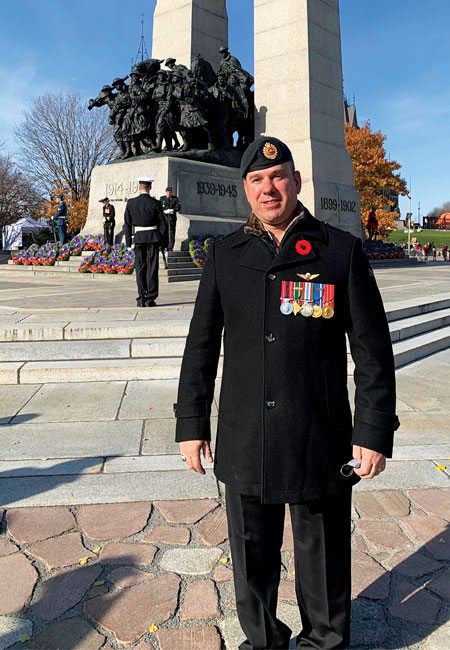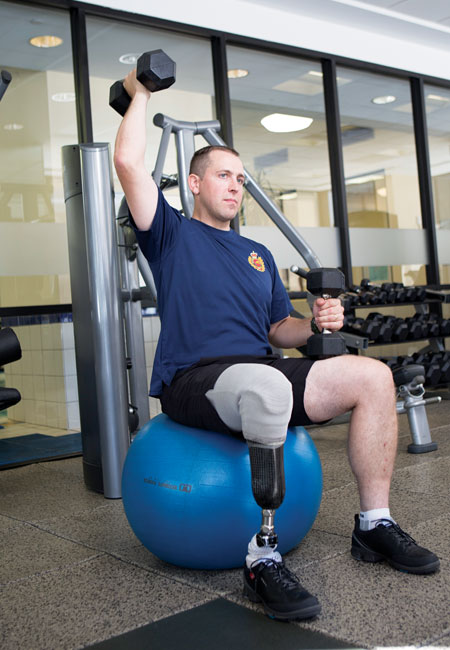Our Work for Veterans
Giving a strong voice to veterans has been a cornerstone of The War Amps since 1918.

Sgt. (Ret’d) Gaétan, a leg amputee, laid a wreath at the 2021 National Remembrance Day ceremony on behalf of The War Amps.
Despite continued challenges brought on by the pandemic, our work to demand legislative reform to ensure adequate support for Canada’s veterans and their families did not slow down. This was especially important in an election year like 2021. The War Amps
continues to be the leader in advocating for veterans’ rights and legislation, as well as the driving force behind the National Council of Veteran Associations in Canada (NCVA).
The War Amps is represented on four of the six ministerial advisory groups to Veterans Affairs Canada (VAC), co-chairing two of these advisory committees.
In 2021, we continued to pressure the Government to apply a “one veteran, one standard” rule regarding benefits and pensions, which also applies to the unequal treatment of veteran caregivers. We advocated as a high priority the reduction of the backlog
– and, therefore, wait times – in the processing of VAC benefits and entitlements. As well, we called for the elimination of the so-called “gold digger’s clause” in relation to the marriage after 60 pension provision that unfairly discriminates
against certain veterans and their spouses.
Confronting the VAC backlog and wait-time crisis
One of the greatest concerns for the veterans’ community in 2021 remains the ongoing backlog and wait-time crisis for veterans making applications for disability pensions and health-care benefits. It is clear that VAC’s actions to increase staffing and
digital resources have not been sufficient on their own to resolve this issue, and it is fully expected that the backlog will only get worse as more Canadian Armed Forces (CAF) members are medically released following the conclusion of
the pandemic.
Throughout 2020 and 2021, The War Amps has made numerous submissions demanding systemic change to departmental adjudication and administration, directed to the Minister of Veterans Affairs and senior VAC officials, as well as undertaken media advocacy
through op-eds and articles in the Hill Times, Esprit de Corps, The Canadian Press and more to bring awareness to this issue.
Our position remains: VAC should accept veterans’ claims at face value (as was done with emergency COVID-19 financial benefits), based on the reasonable evidence provided by the veteran and their family, with the proviso that individual files could be
monitored over time and “spot audits” carried out to address any potential abuses.
At the end of last year, the Standing Committee on Veterans Affairs released a report that accepted the majority of The War Amps and NCVA’s recommendations to relieve the crisis. The 2021 federal budget, brought down on April 19, 2021, proposed to provide
$140 million over five years to address mental health-care while veterans’ disability benefits applications are being processed. Although this proposal does not fully adopt our favoured concept of automatic entitlement/pre-approval, it
does provide a significant step forward in recognizing that treatment benefits should be granted immediately and not be dependent on the disability application process, which can take up to two years. It will be our continuing position
that this approach should be applied to all physical disabilities so that veterans in serious need of health-care or treatment benefits are granted the same sense of priority.
Unfortunately, we were dismayed to learn that this sound budgetary proposal will not actually be implemented until April 2022, an entire year later. We believe that this should have been expedited to meet the need that was clearly articulated in Budget
2021. We also proposed that VAC should provide substantial funding to bolster the Veterans Emergency Fund to increase the maximum benefits per claim and to prioritize applications. While important, this should be seen by the Government
as a stopgap measure and further hiring of staff and the enactment of fundamental systemic change to clear the backlog should be undertaken. As this initiative – and our crusade to end the backlog – develops, The War Amps will continue
to press VAC and the Government to prioritize the needs of veterans.
Calling for change to veterans legislation
With the conclusion of the 2021 federal election, we believe an opportunity exists for the Government to commit to substantially improve veterans legislation to correct the discrimination suffered by disabled veterans and other groups since the enactment
of the New Veterans Charter/Veterans Well-being Act (NVC/VWA) in 2006. Currently, the financial compensation available to disabled veterans and their families under the NVC/VWA differs from the compensation under the traditional Pension
Act, which has led to newer veterans receiving much less support.
The War Amps continues to advocate through the media and submissions to the Government to urge VAC to create a comprehensive program model that would treat all veterans with parallel disabilities in the same way as to the application of benefits and wellness
policies. The “one veteran, one standard” approach provides fairness to all veterans in Canada and acknowledges the financial assistance needed, whether they were injured before or after the arbitrary cut-off of 2006.
In this vein, we advocated for another troubling aspect of current veterans legislation, the “marriage after 60” clause, through our NCVA Legislative Program and media interviews with Brian Forbes, Chairman of The War Amps Executive Committee and of NCVA.
As it stands, CAF retirees contribute to the Canadian Forces Superannuation account throughout their career, and one of the important benefits is a 50 per cent Survivor’s Benefit, except in the cases where a retiree marries after age 60.
The 2015 Liberal election platform indicated this clawback would be removed as a firm government commitment. The 2019 federal budget vowed that a Veterans Survivors Fund program would be implemented but, so far, it has failed to materialize
to remedy this long-standing grievance. We will continue to monitor the operation of the Canadian Forces Superannuation Act to ensure that the interests of veterans are protected and that the infamous “gold digger’s clause” is eliminated
once and for all.
A major step forward for veteran caregivers

Afghanistan war amputee Maj. Blaise
In June, the House of Commons Veterans Affairs Committee released its report on veteran caregivers – who are often family members, especially spouses – and passed it to the House for Parliament’s consideration. In our view, the recommendations in the
report represent a potential major step towards fixing the insufficient and inequitable treatment of veteran caregivers by VAC since the passing of the New Veterans Charter. We were also pleased that our recommendations had been fully
adopted by the committee’s report in relation to replacing the highly inadequate Caregiver Recognition Benefit through the incorporation of the Attendance Allowance eligibility rules (Pension Act) and the more generous Department of National
Defence Attendant Care Benefit provisions.
As with other issues mentioned previously, the Government should follow a “one veteran, one standard” approach by adopting a comprehensive program model for all veteran caregivers, thereby resulting in the elimination of artificial cut-off dates that
distinguish veterans and their caregivers based on whether the veteran was injured before or after 2006.
Unfortunately, when Parliament was dissolved for the election the Government had not taken appropriate action to implement the salient recommendations of the Standing Committee. We will continue to follow this issue as it unfolds and advocate for the
much needed and deserved equal benefits for all veteran caregivers.